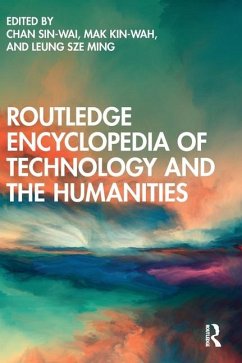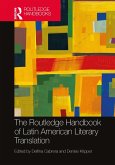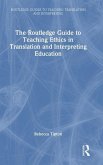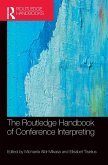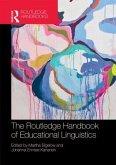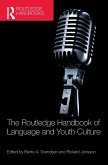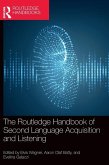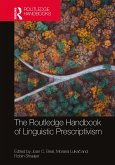Routledge Encyclopedia of Technology and the Humanities
Herausgeber: Sin-Wai, Chan; Sze Ming, Leung; Kin-Wah, Mak
Routledge Encyclopedia of Technology and the Humanities
Herausgeber: Sin-Wai, Chan; Sze Ming, Leung; Kin-Wah, Mak
- Gebundenes Buch
- Merkliste
- Auf die Merkliste
- Bewerten Bewerten
- Teilen
- Produkt teilen
- Produkterinnerung
- Produkterinnerung
Routledge Encyclopedia of Technology and the Humanities is a pioneer attempt to introduce a wide range of disciplines in the emerging field of techno-humanities to the English-reading world.
Andere Kunden interessierten sich auch für
![The Routledge Handbook of Latin American Literary Translation The Routledge Handbook of Latin American Literary Translation]() The Routledge Handbook of Latin American Literary Translation271,99 €
The Routledge Handbook of Latin American Literary Translation271,99 €![The Routledge Guide to Teaching Ethics in Translation and Interpreting Education The Routledge Guide to Teaching Ethics in Translation and Interpreting Education]() Rebecca TiptonThe Routledge Guide to Teaching Ethics in Translation and Interpreting Education195,99 €
Rebecca TiptonThe Routledge Guide to Teaching Ethics in Translation and Interpreting Education195,99 €![The Routledge Handbook of Conference Interpreting The Routledge Handbook of Conference Interpreting]() The Routledge Handbook of Conference Interpreting309,99 €
The Routledge Handbook of Conference Interpreting309,99 €![The Routledge Handbook of Educational Linguistics The Routledge Handbook of Educational Linguistics]() The Routledge Handbook of Educational Linguistics352,99 €
The Routledge Handbook of Educational Linguistics352,99 €![The Routledge Handbook of Language and Youth Culture The Routledge Handbook of Language and Youth Culture]() The Routledge Handbook of Language and Youth Culture303,99 €
The Routledge Handbook of Language and Youth Culture303,99 €![The Routledge Handbook of Second Language Acquisition and Listening The Routledge Handbook of Second Language Acquisition and Listening]() The Routledge Handbook of Second Language Acquisition and Listening301,99 €
The Routledge Handbook of Second Language Acquisition and Listening301,99 €![The Routledge Handbook of Linguistic Prescriptivism The Routledge Handbook of Linguistic Prescriptivism]() The Routledge Handbook of Linguistic Prescriptivism271,99 €
The Routledge Handbook of Linguistic Prescriptivism271,99 €-
-
-
Routledge Encyclopedia of Technology and the Humanities is a pioneer attempt to introduce a wide range of disciplines in the emerging field of techno-humanities to the English-reading world.
Hinweis: Dieser Artikel kann nur an eine deutsche Lieferadresse ausgeliefert werden.
Hinweis: Dieser Artikel kann nur an eine deutsche Lieferadresse ausgeliefert werden.
Produktdetails
- Produktdetails
- Verlag: Routledge
- Seitenzahl: 390
- Erscheinungstermin: 29. April 2024
- Englisch
- Abmessung: 260mm x 183mm x 25mm
- Gewicht: 926g
- ISBN-13: 9781032049427
- ISBN-10: 1032049421
- Artikelnr.: 70146673
- Herstellerkennzeichnung
- Libri GmbH
- Europaallee 1
- 36244 Bad Hersfeld
- gpsr@libri.de
- Verlag: Routledge
- Seitenzahl: 390
- Erscheinungstermin: 29. April 2024
- Englisch
- Abmessung: 260mm x 183mm x 25mm
- Gewicht: 926g
- ISBN-13: 9781032049427
- ISBN-10: 1032049421
- Artikelnr.: 70146673
- Herstellerkennzeichnung
- Libri GmbH
- Europaallee 1
- 36244 Bad Hersfeld
- gpsr@libri.de
Chan Sin-wai is dean of the Ip Ying To Lee Yu Yee School of Humanities and Languages, Saint Francis University President of the Association for Translation Technology, and was a member of the Translation Technology Committee of the International Federation of Translators (FIT). He received his BA from The Chinese University of Hong Kong and his doctorate from the School of Oriental and African Studies, University of London. He has published 62 academic books in 75 volumes, mainly scholarly monographs, bilingual dictionaries, and translated works in different fields. Mak Kin-wah is President of Saint Francis University and Principal of the Caritas Bianchi College of Careers. He received his MBA from City University London, doctorate degree and graduate degree from the University of Cambridge, and undergraduate degree from The University of Western Australia. He is Chairman of English Schools Foundation; Chairman of Hong Kong Society for The Aged; Deputy Chairman of the ATAL Engineering Group; Council Member of The Hong Kong Management Association; and Member of Hong Kong Housing Authority. He is also Member of the Institution of Civil Engineers Hong Kong and Member of The Institute of Marine Engineering, Science and Technology. Leung Sze Ming is Vice-President (Administration) of Saint Francis University and Caritas Bianchi College of Careers in Hong Kong. She earned her PhD in education at The Chinese University of Hong Kong. The integrated learning experience of literature, linguistics, and education enables her to develop a wide range of research interests, for example, teacher feedback, writing instruction, and the use of ICT in language teaching and learning.
List of Figures
List of Tables
List of Contributors
Acknowledgments
Introduction
Chapter 1
Advancing Archaeological Research: The Contribution of Spatial Technologies
Chapter 2
A Critical Pedagogy for Architectural Technology
Chapter 3
Virtual Technology, Online Resources, and Learning with/in Art Museums
Chapter 4
Technology and Interpersonal Communication Ethics: Empathic Communication
in Customer-Chatbot Service Encounters
Chapter 5
DH-XR: Extended Reality's Relevance to the Digital Humanities
Chapter 6
Exploration of the Emotion-Adaptive Engine in the Computer-Aided Design
Process
Chapter 7
Technology and Fashion: Fashioning Technology - Science, Selfs, and Systems
Chapter 8
Deep Learning for Recipe Generation
Chapter 9
Convergence and Fragmentation: End-Users, Dialogic Interaction, and Digital
Heritage
Chapter 10
Ready for the Future? Towards the "Tech" Revolution in Interpreting
Chapter 11
Concept-Based Grammar Teaching in the Digital Era: Potential and Challenges
Chapter 12
Corpus Linguistics and Language Technology
Chapter 13
Technology and Literary Criticism
Chapter 14
Digital Humanities and Classical Chinese Literature
Chapter 15
Re-Scaling Beethoven: Very Long, Very Short
Chapter 16
Philosophy and Technology
Chapter 17
Religion and Technology
Chapter 18
Techno-humanities: Some Trends of the Portrayal of Science in Art on the
Hong Kong Stage
Chapter 19
Being Human in a Technology-driven World: Checkmate or Opportunity for
Social Responsibility?
Chapter 20
Technology and Translation
Index
List of Tables
List of Contributors
Acknowledgments
Introduction
Chapter 1
Advancing Archaeological Research: The Contribution of Spatial Technologies
Chapter 2
A Critical Pedagogy for Architectural Technology
Chapter 3
Virtual Technology, Online Resources, and Learning with/in Art Museums
Chapter 4
Technology and Interpersonal Communication Ethics: Empathic Communication
in Customer-Chatbot Service Encounters
Chapter 5
DH-XR: Extended Reality's Relevance to the Digital Humanities
Chapter 6
Exploration of the Emotion-Adaptive Engine in the Computer-Aided Design
Process
Chapter 7
Technology and Fashion: Fashioning Technology - Science, Selfs, and Systems
Chapter 8
Deep Learning for Recipe Generation
Chapter 9
Convergence and Fragmentation: End-Users, Dialogic Interaction, and Digital
Heritage
Chapter 10
Ready for the Future? Towards the "Tech" Revolution in Interpreting
Chapter 11
Concept-Based Grammar Teaching in the Digital Era: Potential and Challenges
Chapter 12
Corpus Linguistics and Language Technology
Chapter 13
Technology and Literary Criticism
Chapter 14
Digital Humanities and Classical Chinese Literature
Chapter 15
Re-Scaling Beethoven: Very Long, Very Short
Chapter 16
Philosophy and Technology
Chapter 17
Religion and Technology
Chapter 18
Techno-humanities: Some Trends of the Portrayal of Science in Art on the
Hong Kong Stage
Chapter 19
Being Human in a Technology-driven World: Checkmate or Opportunity for
Social Responsibility?
Chapter 20
Technology and Translation
Index
List of Figures
List of Tables
List of Contributors
Acknowledgments
Introduction
Chapter 1
Advancing Archaeological Research: The Contribution of Spatial Technologies
Chapter 2
A Critical Pedagogy for Architectural Technology
Chapter 3
Virtual Technology, Online Resources, and Learning with/in Art Museums
Chapter 4
Technology and Interpersonal Communication Ethics: Empathic Communication
in Customer-Chatbot Service Encounters
Chapter 5
DH-XR: Extended Reality's Relevance to the Digital Humanities
Chapter 6
Exploration of the Emotion-Adaptive Engine in the Computer-Aided Design
Process
Chapter 7
Technology and Fashion: Fashioning Technology - Science, Selfs, and Systems
Chapter 8
Deep Learning for Recipe Generation
Chapter 9
Convergence and Fragmentation: End-Users, Dialogic Interaction, and Digital
Heritage
Chapter 10
Ready for the Future? Towards the "Tech" Revolution in Interpreting
Chapter 11
Concept-Based Grammar Teaching in the Digital Era: Potential and Challenges
Chapter 12
Corpus Linguistics and Language Technology
Chapter 13
Technology and Literary Criticism
Chapter 14
Digital Humanities and Classical Chinese Literature
Chapter 15
Re-Scaling Beethoven: Very Long, Very Short
Chapter 16
Philosophy and Technology
Chapter 17
Religion and Technology
Chapter 18
Techno-humanities: Some Trends of the Portrayal of Science in Art on the
Hong Kong Stage
Chapter 19
Being Human in a Technology-driven World: Checkmate or Opportunity for
Social Responsibility?
Chapter 20
Technology and Translation
Index
List of Tables
List of Contributors
Acknowledgments
Introduction
Chapter 1
Advancing Archaeological Research: The Contribution of Spatial Technologies
Chapter 2
A Critical Pedagogy for Architectural Technology
Chapter 3
Virtual Technology, Online Resources, and Learning with/in Art Museums
Chapter 4
Technology and Interpersonal Communication Ethics: Empathic Communication
in Customer-Chatbot Service Encounters
Chapter 5
DH-XR: Extended Reality's Relevance to the Digital Humanities
Chapter 6
Exploration of the Emotion-Adaptive Engine in the Computer-Aided Design
Process
Chapter 7
Technology and Fashion: Fashioning Technology - Science, Selfs, and Systems
Chapter 8
Deep Learning for Recipe Generation
Chapter 9
Convergence and Fragmentation: End-Users, Dialogic Interaction, and Digital
Heritage
Chapter 10
Ready for the Future? Towards the "Tech" Revolution in Interpreting
Chapter 11
Concept-Based Grammar Teaching in the Digital Era: Potential and Challenges
Chapter 12
Corpus Linguistics and Language Technology
Chapter 13
Technology and Literary Criticism
Chapter 14
Digital Humanities and Classical Chinese Literature
Chapter 15
Re-Scaling Beethoven: Very Long, Very Short
Chapter 16
Philosophy and Technology
Chapter 17
Religion and Technology
Chapter 18
Techno-humanities: Some Trends of the Portrayal of Science in Art on the
Hong Kong Stage
Chapter 19
Being Human in a Technology-driven World: Checkmate or Opportunity for
Social Responsibility?
Chapter 20
Technology and Translation
Index

